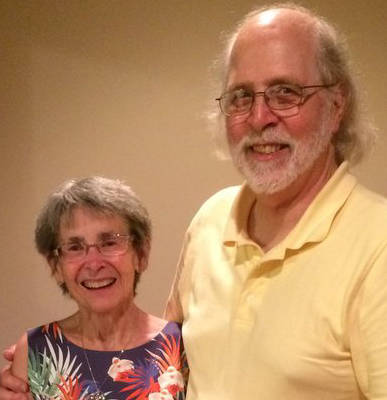

My story is not about my experience with advanced prostate cancer...I suspect you will receive many of these. Rather I am looking at this from the perspective of a caregiver of a spouse with cancer. So, what has it been like to be a caregiver in the setting of a spouse with cancer? It’s a long story, not very pretty but, a story with a happy ending…so far!
Let me tell you that having worked in the field of radiation oncology for 40 years and knowing that nearly every patient waiting to see a radiation oncologist has a potentially devastating disease, significantly colors one’s perception about any ache or pain. In addition, having even a little bit of knowledge about cancer can be frightening.
Twenty-two years ago when my wife was undergoing chemotherapy for the first time for colorectal cancer, I would take her to the infusion center a couple of blocks away from the hospital. I sat with her in the waiting room frequently making it into her treatment room, and watched while the nurse searched for a vein. Beyond that, I couldn’t stand to watch, rose, kissed her and left for the safety of my office two blocks away. She said it was OK but I now know she felt abandoned. It was the only way I could cope with her pain and deal with the frightening prognosis of her advanced cancer. I had confidence in the chemotherapy and her subsequent radiation treatments and the physicians in our department where I worked but, it made it no less difficult to be a part of that experience.
By the time her disease had recurred over seven years later, she had established herself as a respected professor, researcher and colleague in her university. However, her… our lives were abruptly interrupted. The chief of cardiothoracic surgery offered the following advice. “Go home and put your affairs in order. Your disease is too extensive and we have nothing to offer.”
This time, I became fully engaged. We were going to fight and I would be there at every step. The surgery was extensive, the chemo was awful. We leaned on each other and made it through nearly a year and a half of treatment and recovery before she could return to work. We began to live from scan to scan and from one followup visit to the next. Eventually, the disease quit dominating our thoughts but the anxiety never entirely leaves, especially because you always have the reminder of the next scan. My wife’s metastatic disease recurred twice more followed by more surgery and chemotherapy. As fate would have it, she has survived long enough to have breast cancer with surgery radiation 5 years ago accompanied by long term hormone therapy. She wasn’t through yet because within the last year, the little bump on her face turned out to be skin cancer followed by minimal surgery, something that by now to her seemed hardly worth mentioning.
I hesitate to raise the hip replacement surgery likely necessitated as a result of late radiation effects from her colorectal irradiation procedure, the knee replacement surgery due to arthritis and recently, revision surgery of the hip replacement.
My role as the caregiver was not only to stay with her during every treatment and doctor visit but to be her navigator through the complexity of the medical system, her advocate to her doctors, the intermediary with the insurance company and billing offices and to get her to the ER on those multiple occasions when complications overwhelmed her. Cancer is not a one person disease and, I believe it is critical that family support is crucial to the well-being of the patient.
What are the take home messages? First, we are grateful for physicians all along the way who have moved beyond their comfort zones and out of the standards of care to push the edges of the envelop at each step in the management of this potentially lethal disease. Nurses, technical and therapy support persons have been patient and understanding throughout and are critical participants in the care and management of the patient. Of course, we are also grateful for her insurance coverage that has paid for this very extensive and expensive treatment. Second, as a scientist, it is clear that the multi-disciplinary approach with surgeons, medical oncologists and radiation oncologists has had a significant impact upon her outcome. Third, the impact of researchers and drug companies working to understand the biology of disease and to investigate pathways to mitigate those processes cannot be overstated. In this one example of over 20 years of her cancer treatment, we have seen the philosophy of management change from considering it a disease that must be dealt with acutely to one that can be potentially managed as a chronic disease. The critical feature here has been the partnership between the supply chain of innovative treatment devices and drug development, physicians and patients sometimes pushing the edge of the envelope and all working towards a common end. Finally, Father’s Day this year was our 45th wedding anniversary and throughout these past 22 years, there have been occasional tears from both of us and each new ache and follow-up scan brings a bit of anxiety but, she has never faltered, never given in and she has taught us how to live. She completed her PhD program continuing to work full time in research during her initial chemotherapy, radiation and surgery, kept our two sons and me in line, is now a professor in special education, a senior mentor to her colleagues, an author of numerous research publications, a couple of textbooks and, has continued to work full time though we are both looking forward to retirement. We figure that God is not quite finished with her yet.






